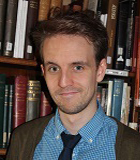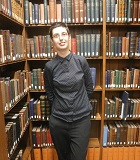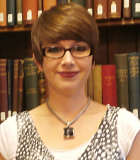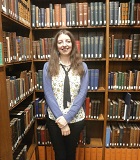‘Books are a delightful society. If you go into a room filled with books, even without taking them down from their shelves they seem to speak to you, to welcome you.’
With the wisdom of William Gladstone ringing in our ears, we asked the ‘delightful society’ of Gladstone’s Library staff to tell us about a book that they love.
A book-list with a difference.
Gary Butler, Library Assistant
Oliver Sacks, On the Move

Like many, the first book I read by Oliver Sacks was his extraordinary, erudite essays on the human brain and its consequences in The Man Who Mistook His Wife for a Hat. Who could resist such a title, let alone the warmth and wonder of the writing it contained? On the Move takes its title from a poem by Thom Gunn. A memoir, it is the last book he wrote before his death last August, aged 82. Both poem and memoir are odes to the virtue of never standing still.
Neurologist, humanist, essayist, motorcyclist, weight-lifter, wild swimmer, and fern enthusiast, Sacks lead a life that a book can barely contain. I was on the move myself the weekend I acquired it, on train after train. However, so captivating was the life within that it was begun on the Saturday and read by Sunday night. Though it took only a short time to read, it has stayed with me far more than many longer spells with other books have. Rarely can life-changing moments be found in one’s life, but reading On the Move was one that changed how I thought of the many possibilities life presents, and how important it is to seize as many of them as you can.
Rebecca Lovell, Intern
Evelyn Waugh – Brideshead Revisited

Brideshead Revisited is a novel which I have never tired of, with its blend of humour, astute critique of class and societal problems, and exploration of memory. Despite the humour, Waugh emphasizes unsettling issues through the representation of his fragile and damaged characters. I find his relentless investigation of the failure to be free from old ways of thought and religious belief in the pursuit of personal happiness, particularly fascinating. This is just another reason why though it is both a book of its time, and an elegy for a time gone by, Brideshead Revisited is a favourite read.
Amy Sumner, Marketing Manager
Chris Kraus – I Love Dick
 I’ve just finished reading I Love Dick by Chris Kraus and why I hadn’t read it before I can’t imagine. It’s an ideal train read – I’ve enjoyed gauging how prudish people are by their reaction to its stark cover almost as much as I’ve enjoyed dissecting its insides. Published in America in 1997, ILD only reached UK shores at the tail end of last year; make of that what you will. It’s a strikingly empowering read. I don’t think there’s anything Lena Dunham’s turned me on to which hasn’t been, but I wasn’t prepared for how much I would learn and how readily I would identify with the quite unambiguous sentiments inside. At the close it still had me scraping about trying to work out how much was autobiography and how much fiction but no matter how or where the lines blur (and I don’t think it does matter, really), it’s the most compelling account of womanhood, and of relationship, I’ve ever read. And the perfect birthday gift – everyone I know, look away now because this is what you’re getting this year.
I’ve just finished reading I Love Dick by Chris Kraus and why I hadn’t read it before I can’t imagine. It’s an ideal train read – I’ve enjoyed gauging how prudish people are by their reaction to its stark cover almost as much as I’ve enjoyed dissecting its insides. Published in America in 1997, ILD only reached UK shores at the tail end of last year; make of that what you will. It’s a strikingly empowering read. I don’t think there’s anything Lena Dunham’s turned me on to which hasn’t been, but I wasn’t prepared for how much I would learn and how readily I would identify with the quite unambiguous sentiments inside. At the close it still had me scraping about trying to work out how much was autobiography and how much fiction but no matter how or where the lines blur (and I don’t think it does matter, really), it’s the most compelling account of womanhood, and of relationship, I’ve ever read. And the perfect birthday gift – everyone I know, look away now because this is what you’re getting this year.
Ceri Thompson, Intern
Terry Pratchett – Discworld series

My favourite reads are the Discworld series by Terry Pratchett. This might be cheating considering that I’ve been asked to name one favourite book and there are over forty in this series, but I love them all equally.
They have been special to me since school – I followed a recommendation to read Reaper Man by my history teacher and have been hooked ever since. The series is a comedy fantasy series, and also Pratchett’s way of satirising our world of the past and present. He connects you to history, while making you laugh with tears of laughter and also makes you connect with the present day world – quotes such as Granny Weatherwax saying ‘evil begins when you treat people as things’ are a timely reminder to pay attention to our present day world.
Pratchett sadly passed away last year, and in many ways I am still devastated by the loss of future stories that will never be told. But I will still happily get to stalk the streets of Ankh Morpork with Captain Vimes and his nightwatchmen, run away with Rincewind and secretly hope that one day I will get to visit the Unseen University’s library and meet the orang-utan librarian who only utters the words OOK! I find these books to be part of my ‘delightful society’ and a society that I will continue to visit over and over throughout my life.
Beth Williams, Intern
Nadeem Aslam – Maps for Lost Lovers

I fell in love with Nadeem Aslam’s minute exploration of British Pakistani immigrant life whilst studying a ‘20th Century British Fiction’ module during my degree. In a few lines it is impossible to do justice to a book that took Nadeem Aslam eleven long years to write.
Like an outsider looking in, Aslam invites the reader to see through different eyes, to enter a sphere of cultural reference that is different to that of Britain. For instance, the unnamed British town in which the novel is set is renamed ‘Dasht-e-Tanhaii’, meaning ‘The Desert of Loneliness’, by its Pakistani inhabitants. The narrators describe their lives through a filter of language from their hometown, and the systems of justice at work are beyond that of the British legal system. The characters are tragically fractured between two worlds.
The British landscape is transformed into a myriad of bright colours and exotic creatures, adding to the outstanding beauty of the novel. Aslam’s flawless prose seems more like poetry.
Maps for Lost Lovers promotes conversation about a difficult subject. It encourages you to question the foundations upon which you base your own identity, and forces you to recognise how much that identity impacts the way you see the world around you.
Niamh Yale-Helms, Work Experience
Nazuo Ishiguro – Never Let Me Go
 Never Let Me Go is a gripping and, at times, desolate insight into the lives of three clones. We are first fully introduced to them as children at their school, Havisham, then as young adults failing to understand the world that created them and finally as adults, who are thrown into the lives of donations and carers expecting to never see each other again.
Never Let Me Go is a gripping and, at times, desolate insight into the lives of three clones. We are first fully introduced to them as children at their school, Havisham, then as young adults failing to understand the world that created them and finally as adults, who are thrown into the lives of donations and carers expecting to never see each other again.
Ishiguro’s narration within the novel is very impactful as it never explains things into the depth needed to answer the frequently occurring questions about the dysphemistic version of Britain in the 1990s.Therefore, he throws his readers into the same states of confusion and uncertainty as her does the characters, allowing us to fully understand what their lives really are and be introduced to a whole new interpretation of the ethics of cloning and true hopelessness.
This has been one of my favourite books since I was introduced to it about two or three years ago, having never read anything before that had struck a chord so deeply to make me fully consider the morality of a topic so frequently discussed. Although strangely the novel isn’t solely focused around being a clone, it is also about the awareness in reflection to your own life and the unacknowledged amount of freedom you truly have. I would encourage anyone who hasn’t already read the book to read it because I personally think it is novel that is deeply touching and moving in many ways.
Compiled by Beth Williams